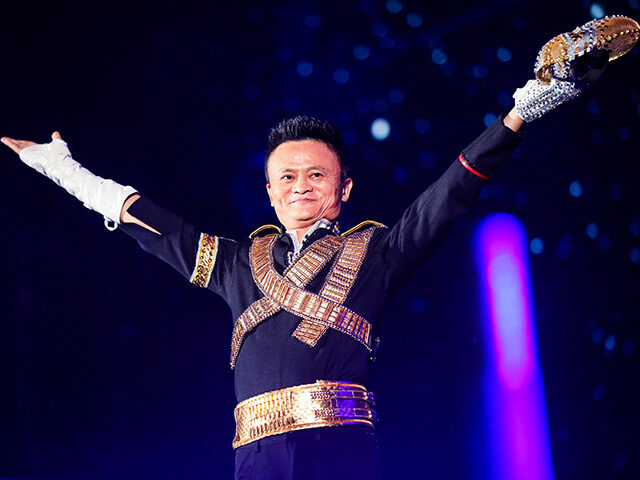China’s desperation to keep nervous international investors from giving up on its flagging economy prompted the regime to turn to its old adversary Jack Ma on Tuesday.
Driven into exile years ago, Ma has resurfaced as the mascot for Beijing’s campaign to keep foreign investment flowing into China.
Ma, the high-flying tech mogul who the Chinese Communist Party crushed in late 2020 after he dared to criticize the party’s economic policies in public, made a high-profile public appearance on Tuesday at Alibaba headquarters in Hangzhou with outgoing CEO Daniel Zhang Yong.
Ma is the co-founder of the titanic Alibaba, but he resigned from all official roles with the company during his years in exile. He returned to China from Japan in March 2023, reportedly at the behest of Premier Li Qiang, who has been placed in charge of renovating China’s business image after years of deranged coronavirus lockdowns and vicious tech industry crackdowns.
Li is said to have concluded that bringing Ma home was the most efficient means of signaling to outside investors that the lockdowns are over for good and showing domestic tech entrepreneurs that the Chinese Communist Party no longer feels it has to teach them who is boss by hammering them with investigations and regulations.
The South China Morning Post (SCMP) described Ma chumming around with Zhang and his replacement as Alibaba chairman, Joseph Tsai, as though he had never left Hangzhou. The men were copiously photographed and videotaped “chatting over drinks and walking through the company’s campus.”
Zhang is stepping down as part of a “massive corporate restructuring that will see Alibaba split into six independently-run entities,” and the SCMP noted that Ma’s old friends are “returning to top corporate roles” after keeping lower profiles during his exile.
Tsai, for example, has been with the company since its founding in 1999, serving as its chief financial officer, and he holds board seats on several of the company’s most important units. Another longtime Ma associate, Eddie Yongming Wu, is slated to take over as CEO of the Alibaba Group after Zhang steps down.
Tsai is an “internationally-focused” executive who owns the Brooklyn Nets basketball team in the United States, while Wu is a sleeves-rolled-up techie who helped to create some of the company’s most important software. For his part, Zhang is not leaving Alibaba but rather will devote himself to making its cloud services division more profitable.
Ma, an exuberant media celebrity before he was stomped into the dirt by dictator Xi Jinping in 2020, looked the happiest he has been in years as he posed for photos at Alibaba headquarters on Tuesday. The SCMP ventured that Ma and his fellow tech entrepreneurs have perked up because they seem to be quietly winning their long policy argument with the Chinese Communist Party:
Recent moves by the company are geared towards reviving Alibaba’s competitiveness, about which Ma has expressed concern. In May, he appeared at an informal meeting with executives in Hangzhou to urge the tech giant to refocus its efforts on Taobao to weather increasing competition and economic headwinds. He cited mobile phone maker Nokia and film giant Kodak as examples of how quickly fortunes can turn for a brand.
Since Chinese tech giants have emerged from an industry crackdown by Beijing that spanned more than a year, the country’s star entrepreneurs have started to reappear in public and, in some cases, reassert control over their empires.
Richard Liu Qiangdong – founder of JD.com, Alibaba’s biggest e-commerce rival – was maintaining a low profile until late last year, when he criticised his company’s senior leadership for poor performance. Most recently, he appeared at a ceremony on June 18 celebrating the company’s 20th anniversary, according to Chinese media reports.
China’s sputtering economy leaves the Communist leadership in no position to slap tech moguls around. Ma’s return to Chinese public life has been mostly as an educator – he is a visiting professor at the University of Tokyo, African Leadership University in Rwanda, and Tel Aviv University, and he attended a math competition in Hangzhou over the weekend before appearing at Alibaba headquarters – and he seems to be filling that role at his own company, mentoring Alibaba executives and signaling the return of the good old days.
“Jack is alive. He’s well, he’s happy, he’s creative. He’s thinking. He’s teaching at a university in Tokyo, spending more time in China,” said Alibaba President Michael Evans at a tech conference in Paris last week.
Evans said Ma “cares as much about this company today as he did when we started, and I expect that will continue for as long as Alibaba and Jack Ma are here.” That seems like a message Beijing is suddenly very eager to send.

COMMENTS
Please let us know if you're having issues with commenting.